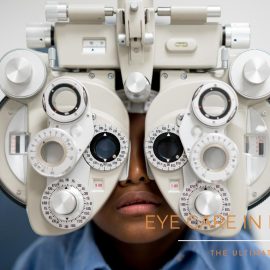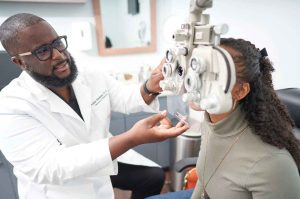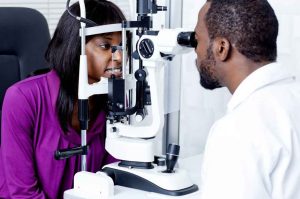How Refractive Errors Affect Our Vision in Nigeria
Vision is one of the most critical senses, impacting how we interact with the world. Refractive errors are common vision problems that can significantly affect the quality of life. In Nigeria, these errors present unique challenges due to factors such as healthcare accessibility, awareness, and socioeconomic conditions. This article explores how refractive errors affect vision in Nigeria, backed by facts, figures, real-time analysis, applications, and recommendations.
Understanding Refractive Errors
What Are Refractive Errors?
Refractive errors occur when the eye cannot focus light correctly on the retina, leading to blurred vision. The primary types of refractive errors include:
- Myopia (Nearsightedness): Difficulty seeing distant objects clearly.
- Hyperopia (Farsightedness): Difficulty seeing close objects clearly.
- Astigmatism: Distorted vision caused by an irregularly shaped cornea or lens.
- Presbyopia: Age-related difficulty in seeing close objects, typically beginning around age 40.
Causes of Refractive Errors
Refractive errors are primarily caused by the shape of the eye. For example, myopia results from a longer-than-normal eyeball, while hyperopia is due to a shorter-than-normal eyeball. Astigmatism is caused by an irregular curvature of the cornea or lens. Genetics, environmental factors, and prolonged near-work activities like reading or using digital devices can also contribute to the development of refractive errors.
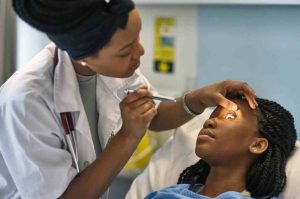
Prevalence of Refractive Errors in Nigeria
Statistics and Data
Refractive errors are a significant public health issue in Nigeria. According to the World Health Organization (WHO), uncorrected refractive errors are a leading cause of visual impairment globally. In Nigeria, studies have shown varying prevalence rates across different regions and age groups. For instance:
- A study conducted in a rural community in Enugu State reported a refractive error prevalence of 18.2% among schoolchildren.
- Research in southwestern Nigeria indicated a prevalence rate of 14.9% among adults aged 40 years and above.
- A survey in Lagos State found that myopia affected 9.6% of the population, hyperopia 4.1%, and astigmatism 7.1%.
Impact on Quality of Life
Uncorrected refractive errors can significantly impact individuals’ quality of life. They can hinder academic performance in children, reduce productivity in adults, and increase the risk of accidents. In Nigeria, where access to vision care services may be limited, these impacts are even more pronounced.

Challenges in Addressing Refractive Errors in Nigeria
Healthcare Accessibility
One of the primary challenges in addressing refractive errors in Nigeria is limited access to quality eye care services. There is a shortage of trained eye care professionals, including optometrists and ophthalmologists. Rural areas are particularly affected, with residents often having to travel long distances to access eye care services.
Awareness and Education
Awareness about refractive errors and the importance of regular eye examinations is relatively low in Nigeria. Many people do not seek eye care services until they experience significant vision problems. Additionally, misconceptions about vision correction methods, such as the belief that wearing glasses can worsen vision, deter people from seeking help.
Socioeconomic Factors
Economic constraints also play a crucial role. Many Nigerians cannot afford the cost of vision correction, including glasses, contact lenses, or refractive surgery. This financial barrier leads to a high prevalence of uncorrected refractive errors, particularly among low-income populations.
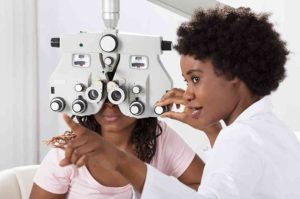
Applications and Interventions
Vision Screening Programs
Implementing comprehensive vision screening programs in schools and communities can help identify refractive errors early. Such programs have been successful in various parts of the world and could be adapted to the Nigerian context. For example, a school-based vision screening program in India reduced the prevalence of uncorrected refractive errors among students by 50%.
Affordable Eye Care Services
Providing affordable eye care services is essential. Initiatives like subsidized eye exams, low-cost glasses, and mobile eye clinics can significantly improve access to vision care. Organizations like the Lions Club International Foundation and VisionSpring have successfully implemented such programs in low-income countries.
Public Awareness Campaigns
Raising awareness about refractive errors and the importance of regular eye exams is critical. Public health campaigns through media, community outreach, and collaboration with local influencers can help educate the population. For instance, the “Eye See & I Learn” campaign in the United States successfully increased eye exam rates among schoolchildren through targeted awareness efforts.
Training and Capacity Building
Increasing the number of trained eye care professionals is crucial. Investing in training programs for optometrists, ophthalmologists, and other eye care workers can help bridge the gap in healthcare accessibility. Additionally, partnerships with international organizations can facilitate knowledge transfer and capacity building.
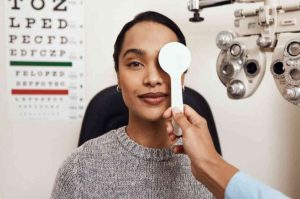
Real-Time Analysis and Trends
Technology and Innovation
Advancements in technology are transforming the field of vision care. In Nigeria, telemedicine platforms are emerging as a viable solution to bridge the gap between rural and urban healthcare access. These platforms enable remote consultations, reducing the need for travel and making eye care more accessible.
Mobile Health Applications
Mobile health applications can play a significant role in vision care. Apps like Peek Vision and Eye Handbook offer vision screening tools, educational resources, and teleconsultation features. These apps can be particularly beneficial in remote areas with limited access to eye care professionals.
Data Collection and Research
Collecting data on the prevalence and impact of refractive errors is essential for informed decision-making. Establishing national and regional databases can help track trends, identify high-risk populations, and evaluate the effectiveness of interventions. Collaboration between government agencies, academic institutions, and non-governmental organizations can facilitate comprehensive data collection efforts.
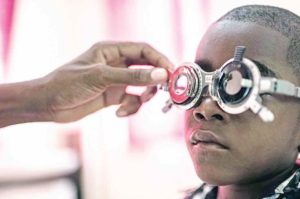
Recommendations for Improving Vision Care in Nigeria
Government Initiatives
The Nigerian government should prioritize vision care by integrating it into national healthcare policies and programs. Allocating funds for eye care infrastructure, training, and public awareness campaigns is crucial. Additionally, implementing mandatory vision screening for schoolchildren can help identify and address refractive errors early.
Collaboration with Non-Governmental Organizations
Partnerships with non-governmental organizations (NGOs) can enhance vision care services in Nigeria. NGOs can provide technical expertise, funding, and resources for vision screening programs, capacity building, and public awareness campaigns. Collaborating with organizations like Sightsavers, the Brien Holden Vision Institute, and the International Agency for the Prevention of Blindness can yield positive results.
Community Engagement
Engaging local communities in vision care initiatives is vital. Community leaders, teachers, and healthcare workers can play a significant role in raising awareness and encouraging people to seek eye care services. Establishing community-based vision screening programs and training local volunteers can enhance the reach and impact of these initiatives.
Improving Access to Affordable Eyewear
Ensuring that affordable eyewear is available to all Nigerians is essential. Government subsidies, partnerships with eyewear manufacturers, and local production of low-cost glasses can help reduce the financial burden on individuals. Additionally, establishing eyewear distribution networks in rural areas can improve accessibility.
Emphasizing Preventive Care
Promoting preventive care through regular eye exams can help detect and address refractive errors early. Healthcare providers should educate patients about the importance of routine eye check-ups and the potential consequences of neglecting vision health. Integrating vision care into primary healthcare services can facilitate early detection and intervention.
Conclusion
Refractive errors significantly affect vision and quality of life in Nigeria. Addressing this issue requires a multifaceted approach, including improving healthcare accessibility, raising awareness, providing affordable eye care services, and leveraging technology and innovation. By implementing comprehensive vision care programs and fostering collaboration between government agencies, NGOs, and local communities, Nigeria can make significant strides in reducing the burden of refractive errors and improving the vision health of its population.


